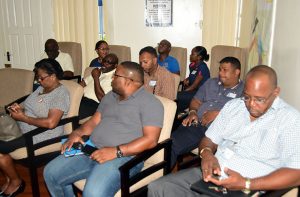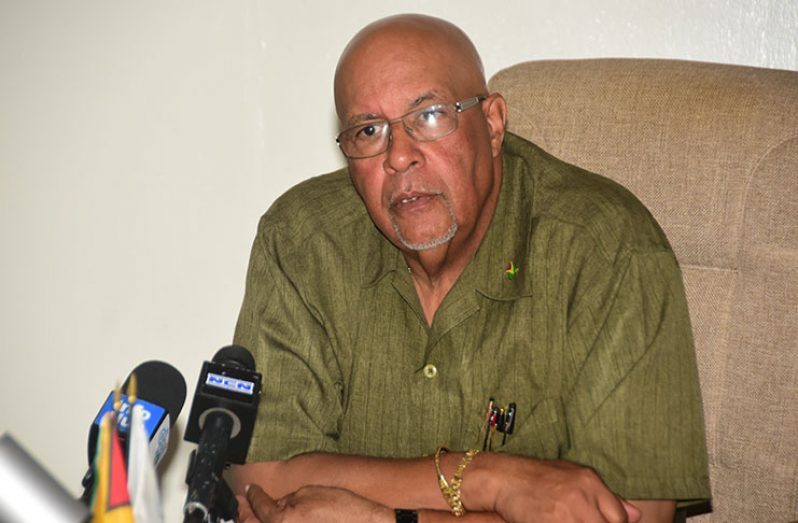– in bid to enlist help disseminating ‘credible information’
MEMBERS of various media houses here were invited on Friday to engage with the Guyana Water Incorporated (GWI) on the topic of the company’s aggressive push for optimal water quality in areas countrywide.
Attending the meeting at the GWI headquarters was Managing Director, Dr Richard Van West-Charles and all of GWI’s Regional Managers.
According to Dr Van West-Charles, the meeting was intended to develop a closer relationship with the media, to update the public on projects and to ensure the dissemination of credible information.
Said he: “I decided on this because, just recently, there were two articles which were written and which, after I read them, I realized that, in essence, they were based on misinformation.
“I think that GWI needs to really find the space whereby we can have a constant engagement with the media in terms of understanding where our programmes are going, what is the impact of the programmes, and what are some of the challenges to the communities that exist.”
The first to acknowledge that GWI may not be aware of the many challenges facing the various communities, especially in the hinterland regions, Dr Van West-Charles said the media could be of great help in this regard, seeing that they are au fait with these issues based on information they may have acquired.
QUARTERLY MEETINGS

He said the company plans hosting similar excises as Friday’s quarterly in its quest to link its resources with that of other agencies, cooperating for the overall development of Guyana’s water security.
This being the case, monitoring water treatment and quality in the Georgetown area was the subject matter of Friday’s first meeting, which saw a presentation coming from GWI Head of Water Quality, Deon Anderson.
Anderson explained how the GWI was able to improve its service to meet the standards of the World Health Organisation (WHO) required guidelines since it began operating under new management in 2015.
He said that in the past, the company was plagued with poor iron removal systems, which resulted in the water being “aesthetically unpleasant”; inadequate water oxygen levels; low-filter media depth; and inoperable and inadequate lime dosing systems.
But with consistent treatment, he said, GWI has been able to increase its iron removal levels from 24 per cent to 96 per cent, meeting WHO standards and eliminating the likeliness of stains and discoloration to customer household appliances.
And with the installation of mixers and motors, both lime dosage and pH balances were optimised, while pall rings were used to increase oxygen transfer to water by some 80 per cent.
Additionally, the GWI has installed 24-hour mini-labs throughout the country for monitoring purposes, which entails the analysis of samples on an hourly basis to detect changes.
The water company has also reported that there are no E. coli contaminants in the water being provided to citizens, but said that should any be detected, immediate interventions will be made to disinfect, resample and restore optimal water quality.
TESTING AND CLEANING
According to Anderson, water testing and cleaning is also being done extensively in schools throughout the country, with focus being placed predominantly on Nursery and Primary Schools.
“At this age,” he said, “you would typically see the children while they’re playing, they go to pipes and they drink water directly from there.
“And, therefore, it’s the mandate of the organisation to have the water quality in each of these learning institutions guaranteed safe and consistent.”
GWI hopes to soon place water quality information on its website, telling customers, based on their area of residence, whether it is safe or not to drink water directly from their taps.
Yet, to get to the point where this is possible countrywide, challenges of power supply, aging pipes, delays in equipment procurement and unmetered customers are interrelated, and must be addressed.
Meanwhile, anticipating that the looming oil-and-gas sector will result in a population increase, the GWI intends to work closely with the Central Housing & Planning Authority (CH&PA) to improve supply in accordance to demand.
The company hopes to train Indigenous People in the hinterland region to build Slow Sand Filters for better water quality, and to introduce water-filter construction into the science curriculums at schools.
Plans are also underway to develop interconnected water systems, to clean old water lines, and to provide potable water to all remote communities and those which still depend primarily on rain water.



.jpg)










